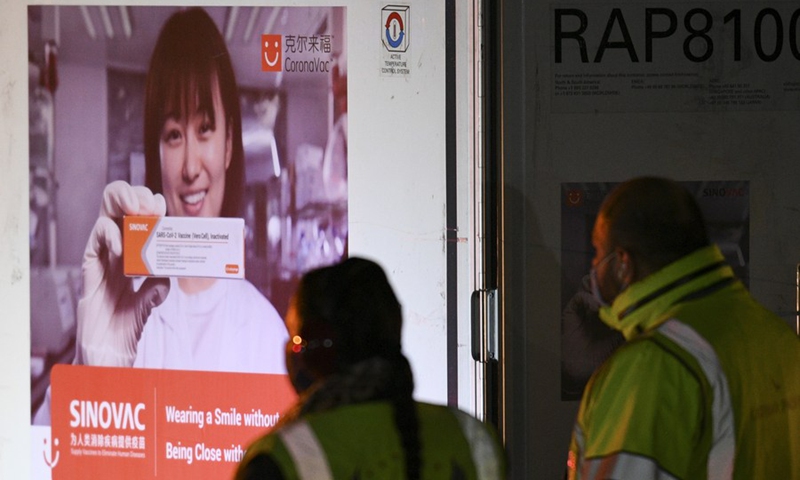
Staff members unload a temperature-controlled cargo container with COVID-19 vaccines from Chinese company Sinovac at Mexico International Airport in Mexico City, Mexico, Feb. 27, 2021.(Photo: Xinhua)
China will launch a "spring sprout vaccine" program to help and secure COVID-19 vaccines for its citizens abroad, and also plans to introduce a Chinese version of a health certificate for international travel to help achieve mutual verification of information on COVID-19 nucleic acid testing and vaccination, Chinese State Councilor and Foreign Minister Wang Yi said at a Sunday press conference.
Wang said that more than 50 countries have already included Chinese nationals into their vaccination plans, and many Chinese nationals overseas are also getting vaccine jabs in other countries according to law.
China is also planning to set up stations for administering Chinese vaccines in countries "equipped with conditions," in order to provide inoculation services for Chinese nationals in nearby countries, said Wang.
Speaking at the press conference on sidelines of the ongoing National People's Congress session, Wang also said that China is to roll out a Chinese version of a health certificate, which, while protecting personal privacy, will help achieve mutual recognition of information on COVID-19 nucleic acid testing and vaccination to allow people-to-people exchange to resume in a safe and orderly way.
Wang said that China is a steadfast advocate of the fair distribution of global vaccines, and is providing vaccines to 69 developing countries for emergency use, and exporting vaccines to 43 countries.
The minister said that the fact more than 60 countries approved the use of Chinese vaccines has proved their efficacy, and China is willing to have discussions with other countries on mutual recognition of vaccination and how it would work.
Wang said that China is also donating vaccines to peacekeepers from other countries, and is willing to work with International Olympic Committee to provide vaccines to athletes participating in Tokyo's Olympic Games.
Rejecting outside rumors that China is engaging in "vaccine diplomacy", Wang said that China opposes "vaccine nationalism", won't accept an "immunity gap" and resists any attempt to politicize vaccine cooperation.
"We hope countries with the ability to do so will try their best to provide vaccines to countries in need, especially developing countries, making vaccines affordable and attainable for people around the world," said Wang.
Global Times




